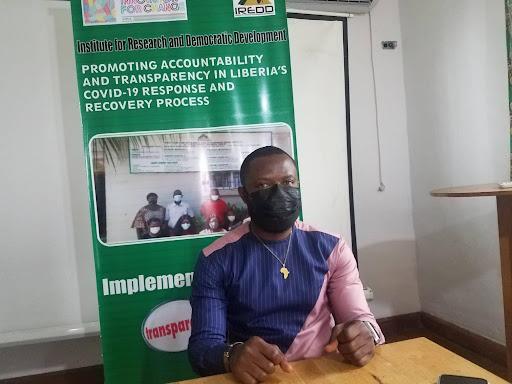IREDD Advocates for Special Budgetary Support to Health Facilities Against COVID-19

IREDD’s Executive Director, Matthias Yeanay made the call on Tuesday July 6, 2021
The Institute for Research and Democratic Development (IREDD) has called on the Legislature to appropriate a special budget for health facilities under legislative review towards the coronavirus fight.
IREDD’s Executive Director, Matthias Yeanay, made the call recently during the release of a survey report on Liberia’s COVID-19 response.
The report, titled: “Promoting Transparency and Accountability in Liberia’s COVID-19 Response and Recovery Process,” is funded by the United States Agency for International Development (USAID) through the United States based organization Tides in partnership with Innovation for Change Africa.
Yeanay indicated that IREDD collected data and assessed whether public health facilities across the country were receiving and properly accounting for direct budgeted medical support to combat the spread of COVID-19 in Liberia.
“The project also monitors procedures and processes public health centers have employed to prevent the spread of COVID-19 in Liberia. IREDD randomly selected 20 public health facilities across Montserrado, Margibi and Nimba counties for the first phase of monitoring,” he said.
He said IREDD’s monitoring survey reveals compelling transparency and accountability related issues amongst many public health facilities lacking direct budgetary support and have in place limited data for real time accountability for other drugs and medical supplies provided by the Ministry of Health and interested partners.
“Key amongst implementation challenges are limited awareness amongst citizens on measures to prevent the spread of Coronavirus; lack of transparency and accountability in budgetary allocation and appropriation at the local level, and low public perception on the efficacy of the vaccine against COVID-19,” Mr. Yeanay said.
According to him, the population still has limited information on ways to prevent COVID-19, even though focus is on mask-wearing and not how to safely wear a mask, or how to remove and dispose of it.
“For this reason, many mask-wearing persons throughout the three counties monitored could be seen wearing masks on their chains instead of properly covering the nose and mouth,” he said.
Mr. Yeanay said in addition, while 75% of health facilities monitored required patients to wash their hands before entering their respective centers, 70% of the same facilities do not require patients to wear masks. Further, 85% do not require any form of social distancing.
“These statistics should raise serious alarm for health authorities to take concrete remedial action to reinforce safety measures at all health centers across the country, otherwise the fight against COVID-19 will continue to be fruitless,” he said.
He said IREDD has monitored 20 public health facilities, of which 75% interviewed stated that they have no knowledge of budgeted medical support to their respective health facilities for the fiscal year, or how allocation of supplies for their health facilities are determined.
According to him, local-level health administrators report that they form no part of the budget planning process and are only supplied drugs and equipment that high-level MOH officials deemed fit for their facilities.
Mr. Yeanay said from all indications, the lack of local level contribution to decision-making in the health sector could undermine the government’s fight against COVID-19 and as well hinder accountability.
“Moreover, in terms of budgetary support to health facilities, records at the E&J Medical Center in Ganta, Nimba County, revealed that the Center’s budgetary appropriation for the previous fiscal year was US$300,000. In the current fiscal year budget, the already inadequate amount has been reduced to US $100,000 with no explanation or justification from officials within the Ministry of Finance and Development Planning (MFDP), MOH and/or the Legislature, which is responsible for budgetary appropriation,” Mr. Yeanay said.
He added that IREDD is inclined to state that Liberia is heavily overwhelmed by the new variant of the COVID-19 pandemic and this is basically due to lack of robust enforcement of health protocol measures.
Mr. Yeanay said unimaginably, the report shows that in less than two months, Liberia has recorded more than 2,326 new cases of the virus. “This news is terribly worrisome and requires leadership at all levels -- concrete remedial action to constrain further spread of the virus, void politics of any form, is now.
